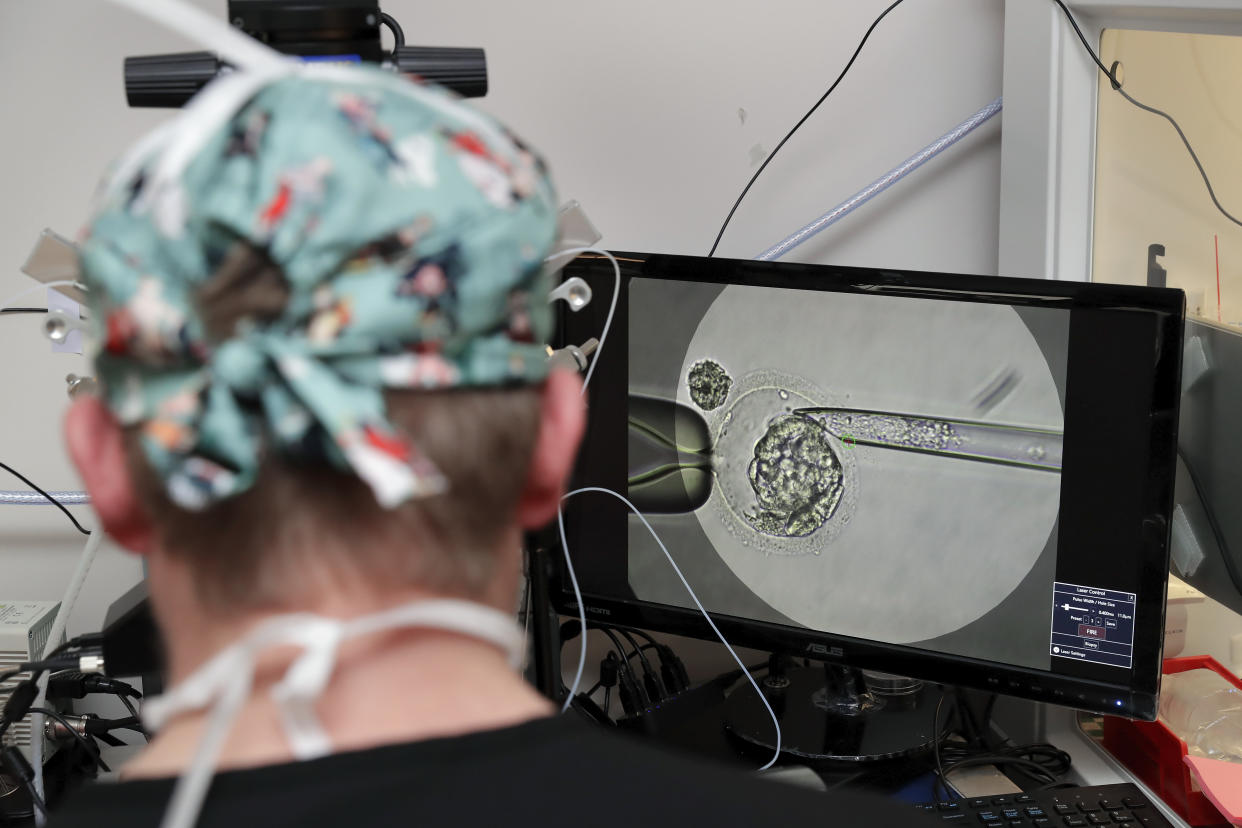Women share photos of their embryos in response to Alabama IVF ruling: 'When one of us hurts, we all hurt'

In response to the Alabama Supreme Court ruling on Feb. 16 that classified embryos as children, women have been posting photos of their embryos across social media.
An embryo is an egg that has been fertilized by sperm. In vitro fertilization (IVF), a process responsible for around 2% of babies born in the U.S., happens when that procedure occurs outside of the body. A key part of the IVF process involves “cryopreservation,” or the freezing of embryos not immediately used but preserved for potential future use. Multiple embryos are typically produced in case IVF cycles aren't successful or if the family would like to conceive multiple children. According to the ruling, someone who destroys or mishandles frozen embryos in the IVF process can be held liable for wrongful death.
The news sent shockwaves through Alabama’s fertility clinics, with many of them shutting down, canceling or delaying IVF processes and upsetting residents who had been trying to start families.
'This is so far from a baby'
That’s why women like Julia Pistell, 40, decided to share a photo of her frozen embryo from when she was going through IVF in 2021. Yahoo News will not be linking to Pistell’s Instagram post, nor other examples of Instagram posts, due to privacy concerns from the women.
“This embryo pictured is a day-5 embryo,” Pistell captioned her post, adding that the embryo later resulted in her child. “Scroll up and look at it. It’s about 100 cells. This is so far from a baby, it’s even wildly far from a fetus.”
Pistell, who is not from Alabama, told Yahoo News that she’s been open about her IVF journey with friends and Instagram followers from the beginning. She thought it was only fitting for her to comment on the Alabama ruling as she knew from previous posts that a lot of women felt alone in the IVF process and appreciated her openness. Her biggest concern with the ruling was about timing.
"Anyone going into IVF probably has at least a year or two of loss, or they're having a personal health problem — like, they have cancer — and they need to do IVF," Pistell said. "I'm 40 — if somebody took my embryos right now and it took me six months to get them back, which isn't even that long, I might not have that baby, because of my age and because of the circumstances of transferring or doing another retrieval."
How long does an IVF cycle take?
The IVF cycle itself takes around four weeks. That doesn't include the years spent trying to have a baby without IVF, medical evaluations, meeting with nutritionists and counselors or any number of complications that could occur during the IVF process.
“If [patients] lose time, they might actually lose the whole opportunity to have that child," Pistell added. “An embryo is not only not a baby, it’s not even probably a baby. It’s possibly a baby."
Emily Orlando, 29, also posted photos of her embryos on Instagram. She told Yahoo News that she had dealt with five years of infertility and two embryo transfers — one that failed and one that resulted in a miscarriage.
“I know how much work goes into IVF and creating embryos; emotionally, physically, mentally and financially,” said Orlando, who is also not from Alabama. “Infertility is unfair enough as it is. The decisions on what happens with each patient's IVF cycle should be between the doctor and the patient.”
While neither of the women are residents of Alabama, both expressed concerns about the future of IVF treatments in the U.S.
“One thing I said to my husband was, ‘Wow, what if IVF really changes in the U.S. in five or 10 years from now? What we did wouldn't be possible,’” Pistell said.
How could the IVF process be affected?
Alice Domar, the Chief Compassion Officer at Inception Fertility and a professor at Harvard Medical School, is one of the leading experts on stress and infertility. She has been researching global infertility rates for the last 37 years and told Yahoo News the Alabama ruling is “catastrophic” and indicative of a larger lack of knowledge about infertility in the U.S.
“We're not talking about someone who's stubbed their toe, we're talking about people who have gone through this exquisitely painful physical, psychological, financial process and to have their cycles canceled or postponed after everything they have been through is so cruel,” she said.
That’s why women are sharing their experiences on social media. Pistell and Orlando said they empathize with the pain associated with infertility — which, Domar argues, is still viewed in some social circles as something to be ashamed about when, in reality, one in six people will experience infertility.
“They say that the infertility community is the worst club to be in with the best members, and that’s truly it. This community is so incredibly supportive and understanding,” Orlando said. “When one of us hurts, we all hurt.”
Domar, who has experienced a miscarriage herself, said she felt lucky to be working in her field because she felt more comfortable talking about it with other people. She said the women sharing their embryo photos on social media will probably have a greater impact than the posters realize.
“I think a lot of people assume you're doing something wrong if you have infertility,” she said. “Wouldn't that be amazing if people who wanted to have a baby, all they had to do was one IVF cycle and put one embryo back and they'd have a baby? That's not how it goes.”


